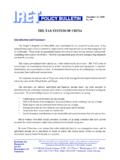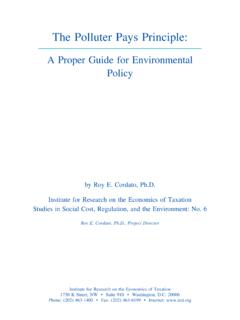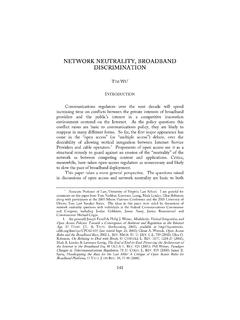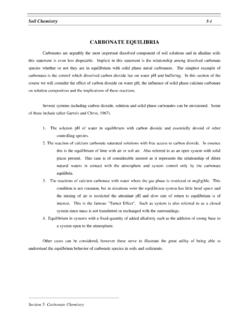Transcription of INSTITUTE FOR RESEARCH ON THE ECONOMICS OF …
1 INSTITUTE FOR RESEARCH ON THE ECONOMICS OF TAXATION IRET is a non-profit 501(c)(3) economic policy RESEARCH and educational organization devoted to informingthe public about policies that will promote growth and efficient operation of the market RHODE ISLAND AVENUE, 11th FLOOR WASHINGTON, 20036 (202) 463-1400 INFLOW OUTFLOW TAX A SAVING-DEFERRED NEUTRAL TAX SYSTEMI ntroductionThe tax system presented in this paper was the last major work of Dr. Norman before his death in August, 1997. It describes his view of an ideal, highly visible, andreasonably simple income tax that is neutral in its treatment of saving and consumption usesof income. It is a simple cash flow tax imposed on individual income.
2 The cash flowaccounting used in the proposal makes it a saving-deferred tax. The multiple layers of tax onestates, gifts, and corporations are eliminated. Together, these changes eliminate the currentincome tax bias against saving and investment and lead to substantial tax simplification. developed this tax proposal in recent years with the help of his staff at purposes of a good tax system raising revenue and "pricing" governmentAny restructuring of the nation s tax system should be based on a set of clear taxprinciples, which should be uniformly applied to the exercise. Those who would redo the taxsystem should start by recognizing the two key purposes of a tax system, 1) to obtain revenueto pay for government goods, services, and activities, and 2) to let the citizen-taxpayers knowhow much they are paying for government, so that they may decide in an informed mannerhow much government activity they wish to support with their principles or attributes of a good tax system neutrality, visibility, fairness, andsimplicityA good tax system should fulfill its first objective, raising revenue, in a manner thatdoes the least damage to the economy.
3 The attribute required to achieve that objective is"neutrality." A neutral tax must be unbiased across economic activities, and, especially, notoverly penalize work in favor of leisure, nor tax income used for saving and investment moreheavily than income used for second objective, letting voters know the cost of government, may be achieved bya tax system with the attribute of "visibility" or transparency to the taxpayers. A very largesegment of the population must be made keenly aware that government costs money ifgovernment spending is to be held to levels at which its benefits match its costs. Toward thatend, taxes should be paid by individuals, not hidden away at the business level or buried inthe prices of principles or attributes of a good tax system include fairness (properlydefined), and reasonable simplicity and clarity.
4 Simplicity and clarity, in turn should lead toeasy, low cost administration and enforcement of the tax rules by the government and lowcost of compliance for means measuring income correctly and then levying taxesevenly on all uses of income by all income producers, without bias, to avoid distortingeconomic neutral, unbiased tax system would begin with a sensible definition of incomesubject to tax. Income is a net concept, revenues less the cost of generating those as a business cannot reasonably be said to have a profit until its revenues exceed its costsof production (properly measured), neither can a worker or saver be said to have income untilhis or her revenues exceed the amounts spent on acquiring the skills or assets that willgenerate the revenues.
5 The full value of all costs of earning revenues should be subtractedfrom revenues before any tax is income has been accurately measured and allocated among taxpayers, it shouldbe taxed even-handedly. Neutral treatment requires that all income be taxed at the same is improper to tax some income at a higher rate than other income, either through graduatedtax rates or by imposing multiple layers of tax on some types of income but not on othertypes of tax system can easily avoid penalizing labor relative to leisure. However, keepingtax rates as low as possible and avoiding graduation avoids the worst of this the tax system even-handed or neutral across various types of saving andinvestment, and between saving and investment and consumption, requires several layers of tax on capital must be avoided, and the basic income tax bias againstsaving and investment must be eliminated by correctly treating saving and investment as costsof earning income.
6 (For greater detail, see Appendix.) In particular: The transfer tax on estates and gifts must be of an estate is saving that has already been taxed. Any parts of an estate thatwas tax deferred saving should remain tax deferred so long as the heirs continue tosave it. The dual taxation of Schedule C corporate income at the corporate and individual levelmust be extra layer of tax on corporations can be eliminated either through "integration" ofthe individual and corporate income taxes or the substitution of a non-income type oftax system. Integration means that corporate income is recognized as belonging to the2shareholders, and is taxed either on individual tax returns or corporate tax returns, butnot both.
7 This puts it on a par with income generated in proprietorships, partnerships,and sub-Chapter S corporations. The tax system must either allow savers to deduct saving or to exclude the returns onsaving from taxable income tax, by taxing both income that is saved and the returns on that income,taxes saving and investment more heavily than consumption. (See Appendix.) Thereare two ways to restore neutrality. One approach is to exclude all saving from taxableincome while taxing all returns on the saving a saving-deferred tax. This is thetreatment currently allowed to a limited degree with pensions and deductible other is to include saving in taxable income but impose no tax on any of thereturns a yield-exempt tax.
8 This is the treatment currently accorded Roth IRAs andtax exempt bonds. Other costs of earning income must also be expensed as outlays must be deducted in the year the outlay is made (expensed), ratherthan depreciated over time, or otherwise delayed or ignored. (See Appendix.)Several types of tax systems would serve to exclude saving and investment or theirreturns from tax, end the bias against saving and investment, and simplify the tax "neutral" taxes include the unbiased income taxes (saving-deferred and yield-exempt)described above, retail sales taxes that exempt investment goods and business supplies fromtax, and value added taxes that allow expensing of investment goods and other intermediateproducts and services purchased from other businesses at each stage of several types of taxes are equally "neutral", choosing among them requires anassessment of their other characteristics and how well they stack up against other importantattributes of a good tax requires that the tax system reveal clearly to the citizen/taxpayerwhat he or she must pay for government goods, services, and activities.
9 Taxes are the "price"we pay for government; taxes "cost out" government for the dictates that the very poor should not be subject to tax. Excepting thevery poor, however, all citizens should pay something to help fund the outlays of the federalgovernment in order that they understand that the resources used by the government are notfree or costless. Taxes should be levied on the largest number of people consistent withcompassionate treatment of those who cannot afford to what stage in the flow of income should taxes be collected? At the business level,after it has made its payments to other firms but before its remaining revenues are paid out toits workers, savers, and investors? When the revenues are received by the workers andowners of the capital as earnings?
10 Or when some portion of their income is spent onconsumption?3 Goods and services do not pay taxes. Businesses do not pay taxes. Only people paytaxes. All taxes, in fact, are taxes on income. Sales and excise taxes either depress sales ofthe taxed products, reducing the incomes of the people who provide the labor and capital usedto make them, or they reduce the purchasing power of that income when the workers andsavers attempt to spend it. Taxes collected by businesses fall in reality on the income of thebusinesses shareholders or other owners, lenders, workers, or customers in the form of lowerreturns or wages or higher taxes are really paid by people out of income, they should be collected frompeople out of income.









